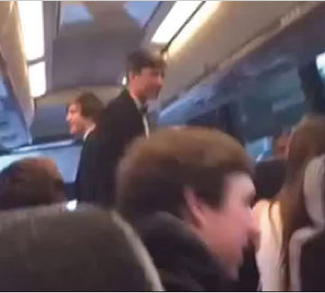There are few better places for nuanced analysis of race and popular culture than cable news. And so it was that the hosts and guests on "Morning Joe" decided to tackle the overlap of rap music and the racist chant that brought down the University of Oklahoma chapter of the Sigma Alpha Epsilon fraternity.
(Quick, almost-certainly-unnecessary background: A group of college kids was secretly filmed while riding on a bus, singing a song that repeated the phrase, "There will never be a n----- SAE" and referenced lynching.)
Co-host Mika Brzezinski noted that rapper Waka Flocka Flame had spoken out against the video, saying that he was "disgusted and disappointed" after having performed at the frat last year. Brzezinski "looked at his lyrics" though, and discovered that Flame himself had used both the "n-word" and "f-bombs." (Her terms.) "He shouldn't be disgusted with them," she said, "he should be disgusted with himself."
Then conservative commentator Bill Kristol weighed in. "Popular culture becomes a cesspool," he said. "A lot of corporations profit off it. And then people are surprised that some drunk 19-year-old kids repeat what they've been hearing." "Exactly," Brzezinski agreed.
"The kids that are buying hip-hop or gangster rap," Joe Scarborough added (after pointing out that much of the audience of the Fox show "Empire" is white, for some reason), "it's a white audience, and they're hearing this over and over again."
So. Let's address these responses in order from least to most contentious.
First, any person who refers seriously to people listening to gangster rap should be encouraged to update their now two-decade-old cultural references. (Anyone who mentions "buying" music is doing better; only about five years out of date.) Does "gangster rap" exist? Sure? Sort of? But the term arose to describe a particular type of music in a moment when hip-hop was emerging in the early 1990s. Hip-hop is now integral to American culture, and the specific moment that gave birth to "gangster rap" -- Southern California at the apex of the crime wave -- has passed.
Second, yes, black musicians use the n-word in their work. As Willie Geist of "Morning Joe" pointed out during this morning's debate, context matters. "There is a distinction between white kids on a bus singing about hanging someone and Waka Flocka singing a song," he said. The best argument about why black people are welcome to use that word while white people are not was made, very simply, by the Atlantic's Ta-Nehisi Coates.
"The meaning of human language changes with context," he wrote last year. "That is why you may call your wife 'honey,' but I probably should not." You may not like music that includes the n-word, as Bill Kristol apparently does not, but as Geist points out, it's nowhere near equivalent. And when the point of the song is that black people should be excluded or hanged? Not really a debate.
Third, Kristol's claim that "some drunk 19-year-old kids" are "repeat[ing] what they've been hearing" is way off the mark. First of all, "There will never be a [n-word] SAE" is not a lyric from a rap song. The Los Angeles Times' Matt Pearce pointed out people who indicated that the chant itself was widespread nationally. This woman says she heard it in 1974, somewhat before the advent of "gangster rap."
It's also worth noting that there is a long, long, long tradition of including racial slurs in rhymes, often ones aimed at children. Familiar with the Agatha Christie book, "Ten Little Indians"? The original title was "Ten Little N------," based on a nursery rhyme about black children dying in various ways. Older versions of the nursery rhyme "Eeny Meeny Miny Moe" used "n-----" in lieu of "tiger." And there are many more examples.
If the SAE kids suddenly discovered the word after listening to rap music, they've lived particularly sheltered lives.
The fourth and most important point: Criticizing Waka Flocka Flame's music and the "cesspool" of popular culture is just a redirection away from the actual grotesqueness at hand: A group of young people singing a song about excluding and murdering black people as a lark. There are worse examples of racism in the world and more damaging ones. But the problem with the SAE's singalong racist chant was that they were engaged in a singalong racist chant. The problem that needs to be fixed isn't rap music. It's things like blaming rap music for racism.
Update, 2:00 p.m.: We will note that, earlier in the program, the show included Marc Morial, president of the Urban League, who agreed with Kristol that there should be "accountability" for "those that make money, that distribute, that sanction, the use of these words ... I would call disparaging." (That came after Kristol argued that "These hip hop artists are not just producing these things on YouTube videos on their own," which is not entirely accurate.) NBC has not provided an official comment; if they do, we will add it.
Update, 4:30 p.m.: Brzezinski appeared on MSNBC's "The Five" to address the outcry that resulted from this morning's segment. "[T]he students in the video are responsible for their behavior," she said. "And as we said in our show this morning, they did it. And it's beyond appalling. The video is actually disgusting and disturbing to watch. And that's what we said on show this morning."
She continued: "In no way is anybody else to blame for what they did on that bus. They are responsible. They made that choice. On another point, there may be a good conversation to have out there about rap music, hip-hop and lyrics and use of the N word and whether or not it should be allowed to be used on where, in what form and what platform. But there is no moral equivalency between any lyrics and what happened on that bus. We said that this morning on our show."
